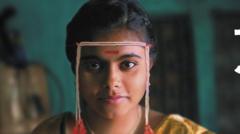In a society where arranged marriages are the norm, a new Marathi film titled Sthal: A Match brings the hidden humiliations faced by women into the spotlight. Set in rural Maharashtra, the film tells the story of Savita, a determined young woman aspiring for education and independence, as she navigates the relentless pressures of finding a suitable husband. Premiering in Indian theaters soon, Sthal has already garnered acclaim at various film festivals.
Directed by Jayant Digambar Somalkar, Sthal presents a heart-wrenching narrative that dives deep into the cultural fabric of Indian society. With Savita’s father, Daulatrao Wandhare, keen on securing a good match amid financial struggles as a cotton farmer, viewers witness the painful scrutiny faced by young women during the matchmaking process.
In a powerful opening scene, Savita endures a humiliating interview from her prospective suitors, a role reversal where her worth is appraised through a lens clouded by shallow expectations. "She's a bit dark... She's also short," the men comment, reducing her identity and value to mere physical traits. Such a portrayal starkly contrasts with the glamorous depictions often seen in Indian cinema, as emphasized by Somalkar, who aims to shed light on the grim reality faced by many.
While Savita yearns for a career, societal pressures deem marriage as her only path to success, echoing the sentiments shared by her co-star Nandini Chikte, who portrays her. As the film dives into the taboo topic of dowry, the stark portrayal of parents selling property to meet wedding demands resonates with the struggles faced by many families.
Somalkar’s inspiration stems from personal experiences with arranged marriages, seeking to provoke discourse around gender roles and societal expectations. Sthal stands out not just for its narrative but also for its casting of local, first-time actors who deliver authentic performances grounded in reality.
As Sthal prepares for its theatrical release, it challenges viewers to reconsider the pressures embedded in arranged marriages. The film serves as a poignant reminder that while weddings are often celebrated, the journey to reach that point can be filled with heartbreak and objectification for countless women in India.





















